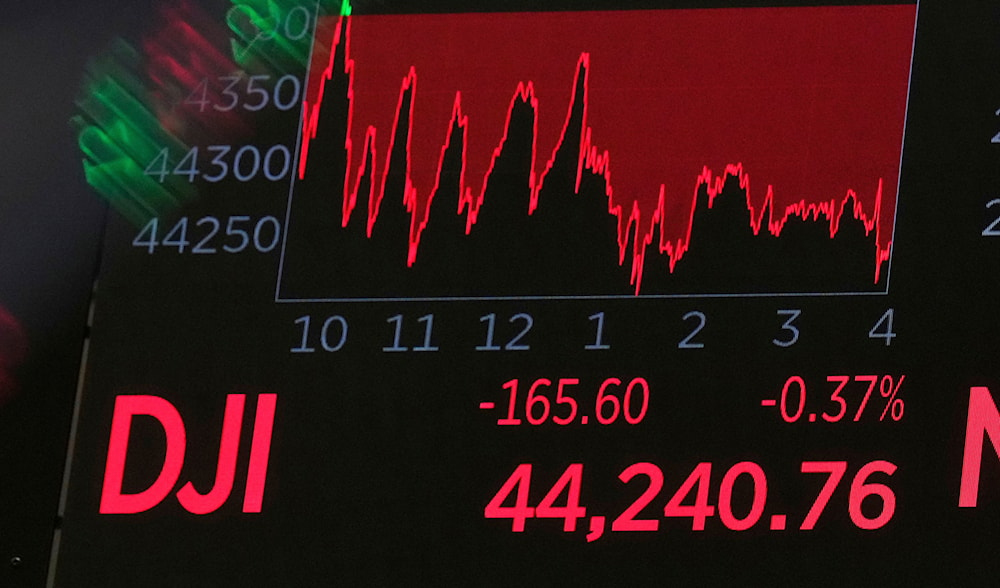Tariff theater or policy shift? Markets may be misreading Trump
Wall Street once dismissed Trump’s tariff threats as bluster, but his renewed aggressive trade moves are putting faith in the so-called "Taco Trade".
-

A board above the trading floor of the New York Stock Exchange displays the closing number for the Dow Jones Industrial Average, on July 8, 2025. (AP Photo/Richard Drew)
For most of the year, investors have leaned on a familiar playbook: Trump talks tough but rarely follows through, a pattern dubbed the “TACO trade,” short for Trump Always Chickens Out. The phrase, born during his first term, underpinned a post-April market rally that sent the S&P 500 soaring more than 30%. That said, traders bet that stock market optics mattered more to Trump than policy follow-through.
The Financial Times argues in a report on Saturday that this bet may not hold through.
Trump reignites tariff war
According to the Financial Times (FT), this week marked a dramatic escalation in Trump’s trade policy. Beginning on Monday, over 20 countries, including Japan, South Korea, Thailand, and South Africa, received formal letters from the White House warning of new punitive tariffs ranging from 25% to 40%.
Countries that were not contacted directly were told to brace for blanket rates as high as 20%.
By Thursday, the scope widened, and a 50% tariff on copper was announced, along with a proposed 200% duty on pharmaceutical goods. Moreover, Canada, one of the US’ closest trade partners, faced a 35% tariff threat. The European Union was similarly warned of more restrictions ahead.
One of the most pointed actions was aimed at Brazil. Trump accused President Lula’s government of suppressing free speech and proposed a 50% tariff in what analysts described as political retaliation for the prosecution of former Brazilian president Jair Bolsonaro. In response, Brazil’s currency tumbled 2.3%.
Experts warn markets are misreading Trump
The report detailed that despite the aggressive posture, equity markets remain surprisingly calm. It added that the S&P 500 hit record highs this week, and volatility levels remained low, while financial leaders started to sound the alarm.
"There is some complacency around the Taco trade," Vincent Mortier, Chief Investment Officer at Amundi, told the FT. JPMorgan CEO Jamie Dimon offered a similar caution: "Unfortunately, I think there is complacency in the market."
On another note, a former senior White House official noted that Trump has always favored tariffs as leverage and may be more inclined to act this time. "Markets have cruised on. Will there be a day of reckoning?" asked Robert Tipp, head of global bonds at PGIM.
Trump's fragile negatiation strategy
The tariffs are part of a strategy announced in April, when Trump declared "liberation day" and introduced a 90-day timeline to strike bilateral trade deals with key partners. At the time, Trump promised "90 deals in 90 days."
But the results have lagged. As of mid-July, only three countries, the UK, China, and Vietnam, have finalized agreements. Talks with major economies like Japan, India, and the EU remain unresolved.
It is worth mentioning that the US dollar has had its worst start to a year since 1973, signaling cracks in global confidence. At the same time, government borrowing costs, measured through long-term Treasury interest rates, are creeping up, reflecting growing concerns about America’s rising debt and the stability of its institutions.
Adding to the unease, Trump has renewed his attacks on the Federal Reserve, raising alarms about political interference in what is meant to be an independent body. That kind of pressure is making investors and global partners question whether the US can still be trusted as a reliable economic leader.
As one US banker put it: “The perception of America as a stable, reliable store of value has been dented.”
What if Wall Street is wrong?
The cost of miscalculation is significant, according to FT, adding that a 200% tariff on pharmaceuticals could disrupt global healthcare supply chains. The copper duties risk rippling through construction and tech manufacturing, and retaliation from US allies could permanently reshape global trade architecture.
Beyond economics, the broader concern is institutional. But Trump’s willingness to sideline the Federal Reserve, pressure allies, and bypass traditional negotiating channels may redefine how the US engages the global economy.
According to FT, Trump’s tariff threats may still prove to be political theater, but the signals from Washington suggest this time, they might not.

 4 Min Read
4 Min Read









